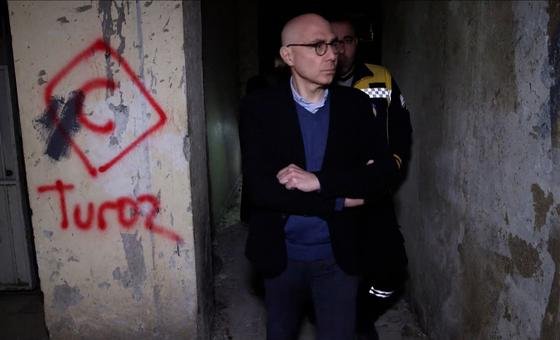Volker Turk said from the capital Damascus on Wednesday after a meeting with the leader of Syria’s caretaker government, Ahmed al-Shara, that he “assured respect for human rights for all Syrians and various elements of Syrian society”.
Volker Turk said Syria’s acting leader, Ahmed al-Sharaa, has highlighted “efforts to work towards healing, confidence-building and social cohesion and reforming institutions”.
It is noteworthy that on December 8, Ahmed al-Shara led the campaign to oust then-President Bashar al-Assad, led by opposition fighters Hayat Tahrir al-Sham (HTS).
desperate need
UN High Commissioner for Human Rights Volker Turk also said that “… the challenges are enormous, millions of lives have been lost” and large parts of the country have been destroyed.
He said that currently in Syria, an average of nine out of 10 Syrians are “trapped in poverty, the health system is broken and many schools are closed.”
“Millions of people are still displaced inside and outside the country. Right to food, health, education and shelter are fundamental human rights and immediate, concerted and concerted efforts must be made to ensure their guarantee.”
The UN human rights chief has called for an “urgent review” of lifting international sanctions on Syria, saying it is important to consider their impact on the lives of the Syrian people.
The horror of sednaya
Volker Turk is the first UN High Commissioner for Human Rights to visit Syria. He said, he heard the painful stories of many victims of torture.
It includes accounts of some held at the notorious Sednaya prison on the outskirts of the capital Damascus, where his office has documented human rights abuses “for years”.
The UN rights chief heard from prisoners that “when in the early morning, they heard the guards at their door, they trembled with fear, they went to the back of the cell for fear that they would be tortured again.” would be banished, or even killed.”
The High Commissioner for Human Rights says thousands of people have died in Syrian prisons. He condemned the bombing of the residential area of Jobar in Damascus, which had turned the area into an “apocalyptic wasteland”.
Genocide, destruction
Volker Turk said that “not a single building in the area was spared from the bombing in this attack.”
“Such carnage and destruction is unimaginable.”
The UN human rights chief said it was equally hard to believe that “banned chemical weapons have been used against civilians in other parts of the country, not just once”.
This situation “speaks volumes about the extreme brutality of the tactics used by the former government”, whose actions “constitute the most serious crimes under international humanitarian law.”

